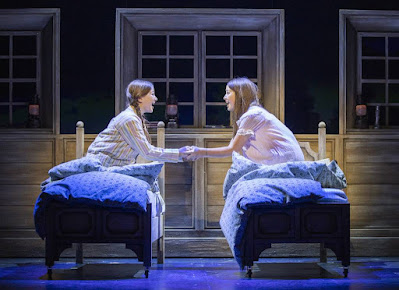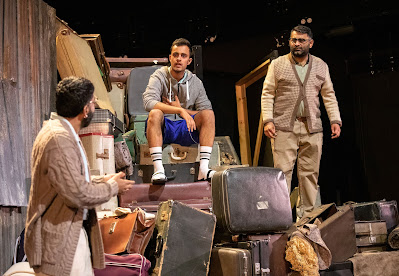Nottingham Playhouse
6th August, 2022, matinee
“They are identical”
The premise of this world premier has, on paper,
the perfect formula: based on a well-loved story, with music and lyrics by the
UK's foremost composers and directed by a theatre legend. It is pleasing to see
new musical theatre writing being performed at this scale with such polish and
with creatives of this calibre involved. On the whole, Identical is an
entertaining slice of whimsy, while not quite exceeding the sum of its parts.
Following the scrapes and schemes of Lottie and
Lisa, twins separated at birth, Stuart Paterson's book owes more to Erich Kästner’s
original novel than the various film adaptations. Located in 1950’s Germany and
Austria we’re treated to some stunning European set design, making great use of
moving LED screens in which Douglas O’Connell’s video designs meltingly
transport us from rural holiday camps to train stations, theatres and palatial
mansions. I’ve often been cynical of the over reliance on video effects in
theatre, but this has completely won me over, as the designs seamlessly blend
with Robert Jones’s physical set pieces and effectively expand the world upon
the stage. Returning to the story’s roots lends the piece a classic air, even
if the lack of modernity and Nunn's direction favours quaintness over comedic
potential.
Stiles and Drewe’s music and lyrics
are ebullient and accessible. From the wry “It’s Not for Me to Say” to more
emotional ballads like “We Were Young”, the music often helps to advance
character. I particularly enjoyed “Little White Bird”, played after the twins
have reunited, in which Lisa’s poem accompanies Lottie’s self-composition on
the piano perfectly. It shows their synchronicity and implicitly reflects Stiles
and Drewe’s song-writing process. But it’s the title number which is really
memorable and the tune I’ve found myself humming a few days later.
Nunn creates some stunning set
pieces. I particularly enjoyed the ballet scenes which later bleed into
Lottie's nightmarish visions of being torn from her sister as a baby, set
against a fairytale backdrop worthy of the Brothers Grimm. Large ensemble
moments such as these are countered with many intimate scenes between the
sisters and their parents. Emily Tierney and James Darch are both charming as
the estranged couple, and Louise Gold and Michael Smith-Stewart make an
entertaining double act as Johan's housekeeper, Roza, and the local Doctor. At
this performance Lisa and Lottie were played by Eden and Emme Patrick, and both
girls impressively lead the show with great skill and charisma. Casting Director,
Anne Vosser, has accomplished a real coup in finding not just one, but three
sets of triple threat identical twins. The relationship between the girls is completely
believable and very sweet, ensuring the piece is full of heart.
The piece is quite long at just shy
of three hours. In particular, there are some bits of exposition, even late in
the show with characters explaining to each other what’s happened, which aren’t
necessary. On the other hand, I felt that some cuts had possibly already been made
which left parts of the show not making sense. For instance, a sub-plot in
which Roza has been stealing money to send to her ill sister seems somewhat misplaced.
Is this simply to convey that Lotte has better Maths skills than her sister and
is able to spot that money is missing from the household? If so, I think other
parts of the book achieve this already. I also couldn’t help but wonder if the
dog, which barely gets any stage time, had another scene in which he excitedly
welcomes the returned twin sister.
But these are all kinks I’m
confident can be ironed out if the musical were to – and surely it must – have a
further life. It may be twee, but Identical
is also entertaining and bright, and spot-on musical theatre escapism.
Identical ran at the
Nottingham Playhouse until 14th August. It plays at The Lowry,
Salford, from 19th August – 3rd September.

Emme Patrick and Eden Patrick in Identical. Credit: Pamela Raith.

